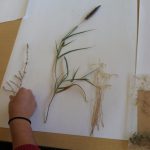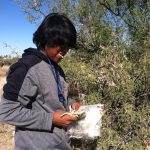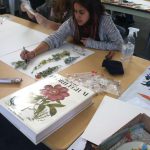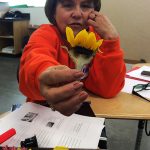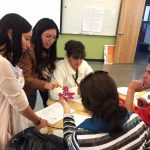Our day-to-day life here at Western Institute for Leadership Development (WILD) is infused with the study and appreciation of plants. Several school-wide, year-round projects reflect our belief that the study of botany, ecology, and the environment is fundamental to an education that provides young people with the knowledge and skills needed to become leaders and changemakers in their communities and in the world.
Watch the video about our WILD fascination of plants:
Restoration Ecology
We are currently partnered with Tucson Audubon Society in a restoration ecology project on the acreage behind the school. Our goal is to restore the 10-acre urban core by identifying beneficial and native plants that would thrive on that land, studying what plants are growing there already and ridding the area of invasive species, and propagating plants which will then be planted on the land. We have studied the water pathways and identified which plants would benefit from lower lying areas that catch the monsoon rains, and which plants would need a higher location.
Seed Propagation
We have also begun the process of collecting seed from existing beneficial plants so that we can propagate those as well. For example, we noticed that certain plants were a shelter for ladybugs, and we intend to grow more of those to attract more ladybug to the property. So far we have dug basins and planted many native species, such as penstamon, desert marigold, baja fairy duster, globe mallows, as well as native grasses. We have also marked an area to be developed as a mesquite bosque, and now have mesquite and palo verde seedling in our shade houses waiting to be planted.
Ethnobotany and Food Security
Because of our interest in ethnobotany and food security, seed-saving is of high priority to us. We are creating a seed bank here at school, with the purpose of sharing, storing, and providing seed for the school families and surrounding community. Recently we hosted a Spanish-language seed saving workshop in partnership with Native Seeds/SEARCH which attracted participants from all over Southern Arizona as well as Mexico. Students are actively engaged in the saving of seeds from our gardens as well as from the land behind the school.
Data Collection and Recording
We are also creating a mini-herbarium which preserves dried and pressed samples of plants we collect on our land and serves as a record of the work we are doing here. The plants are collected, identified, classified, pressed and preserved on archival paper.
Growing Knowledge: Propagation and Grafting
Our school is home to aquaponic systems which are set up in our classrooms, organic vegetable gardens, wildflower beds, two hoop houses and one shade-house, and we have plans for the coming year to plant a fruit orchard and expand our knowledge of propagating into the area of grafting. Much of this work is done in conjunction with the Community Food Bank of Southern Arizona.
We are dedicated to the study and protection of plants on local and global levels, and are grateful to all of our community partners for sharing their time and expertise with us.
This post was submitted by the students and teachers at the Western Institute for Leadership Development (WILD) in Tucson, Arizona.


